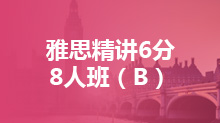新航道-用心用情用力做教育!
子业务线


注册 | 登录
退 出
雅思阅读材料之中国家庭中为什么不说我爱你?
2014-02-26 浏览:
来源:新航道官网
免费咨询热线:400-011-8885

"I love you" might be one of the most important combinations of three words in the English language. It's the signal that a romantic relationship is serious, an indication of closeness for a sibling, parent, or child, and a constant refrain for pop songs.
“I love you”可能是英语中三个词组成的最重要的一句话了。它是认真对待恋爱关系的标志,它是兄弟姐妹、父母或孩子之间亲密程度的象征,它也是流行歌曲副歌部分的常见内容。
In Mandarin, "I love you" translates as “我爱你” (Wo ai ni), but the way it's used in China might be a little different, and Chinese state media is wondering why.
“I love you”用普通话说是“我爱你”,但是这句话在中国的用法可能有点儿不同,中国的官方媒体也想知道原因。
The Global Times reports that two online videos showing children telling their parents "I love you" have gone viral in China. The first, filmed by an Anhui TV station, shows a number of college students telling their parents they love them. The response are mixed. "Are you drunk?" asked one parent. In another similar video, shot by a Shanxi TV station, a father responded even more bluntly — "I am going to a meeting, so cut the crap."
《环球时报》报道,有两个记录孩子告诉父母“我爱你”的视频在中国火了起来。个视频是由安徽卫视录制的,在视频里一群大学生告诉父母自己爱他们。父母们的反应各不相同。“你喝醉了吗?”一位父母问。另一个类似的视频是山西卫视录制的,一名父亲的反应就更不客气了——“我要去开会去了,废话少说。”
Even the positive reactions make it clear that the words are expressed rarely: "I am so happy you called to say that, it is the happiest thing that happened to me in 2014," one parent answered.
即使是正面的回应,父母清楚地表明这句话用的很少:“我很高兴你打电话说这句话,这是我2014年最开心的一件事了。” 有个家长这样回答。
Why don't Chinese families use those words? Theories revolve around the nature of Confucian teaching. "The parents' responses show that many Chinese are not good at expressing positive emotions," Xia Xueluan, a Sociologist from Peking University, told the Global Times. "They are used to educating children with negative language."
为什么中国家庭不说这句话呢?普遍的观点认为是受到儒家思想的影响。“父母们的反应表明大部分的中国人不擅长表达积极的情感,” 北京大学社会学家夏学銮对《环球时报》的记者说。“他们习惯用负面的语言来教育孩子。”
This isn't the first time that China has done some soul-searching about familial love — last year China Daily asked a cross-section of people if they said 'I love you' to their parents, spouses, and children. "I have never said 'I love you' to my family, and I don't think I will in the future," one 56-year-old told the paper. "Saying it aloud is embarrassing for me."
这不是中国次做关于亲情方面的自省——去年《中国日报》就各个阶层的人进行了采访,询问他们是否对父母、爱人和孩子说过“我爱你”。“我从来没对我的家人说过‘我爱你’,我觉得我以后也不会说,”一名56岁的被采访者回答《中国日报》的记者。“把这句话说出口,我会觉得很难为情的。”
Still, that doesn't mean that love can't be expressed. In a separate article, China Daily spoke to Zhao Mengmeng, a 31-year-old woman who said she had never told her father she loved him face-to-face ("I find it a bit odd"). Sometimes actions speak louder than words, however — Zhao gave her father, a photo album featuring photographs of them together on almost every one of her birthdays in June 2012. The pictures went viral online, being forwarded hundreds of thousands of times on Weibo.
然而这并不是说爱就无法表达。在另一篇文章中,《中国日报》采访了31岁的赵萌萌,她说她从来没当面对她爸爸说过她爱他。(“我觉得那样会怪怪的”)。但有时行动胜于言辞——赵萌萌在2012年六月送给了她爸爸一个相册,里面装满了他们两人在她每年生日时的合影。照片在网上火了起来,在微博上被转发了几十万次。
"I didn't sleep the night I heard about it," her father told China Daily after the story attracted mainstream attention. "I have now memorized some of the comments on the collection of pictures."
“当我知道时,我一晚上没睡,” 在这件事受到了主流媒体的关注后,她爸爸这样告诉《中国日报》的记者。“现在我还能记起一些照片下面的评论。”
以上就是新航道雅思频道为大家整理的雅思阅读材料之中国家庭中为什么不说我爱你?,希望对大家有帮助,更多资讯、资料请访问新航道雅思阅读频道 http://www.xhd.cn/ielts/yuedu/

版权及免责声明
1.本网站所有原创内容(文字、图片、视频等)版权归新航道国际教育集团所有。未经书面授权,禁止任何形式的复制、转载或商用,违者将依法追究法律责任。本网站部分内容来源于第三方,转载仅为信息分享,不代表新航道观点,转载时请注明原始出处,并自行承担版权责任。
2.本网站内容仅供参考,不构成任何决策依据,用户应独立判断并承担使用风险,新航道不对内容的准确性、完整性负责,亦不承担因使用本网站内容而引发的任何直接或间接损失。
3.如涉及版权问题或内容争议,请及时与我们联系,电话:400-011-8885。
下一篇:
雅思阅读材料之“西雅图遇上煎饼果子”
热门项目
免费预约试听
手机号码:
验证码:
意向课程:
请选择
- 雅思
- 托福
- A-Level
- 留学
- 考研
- KET/PET
- OSSD
- DSE
- TOEFL Junior
- 多领国
- 小语种
- 锦秋国际
- AP
- GRE/GMAT
- SAT/ACT
- PTE
- 腾飞计划
- 其他
您的称呼:
热门活动







